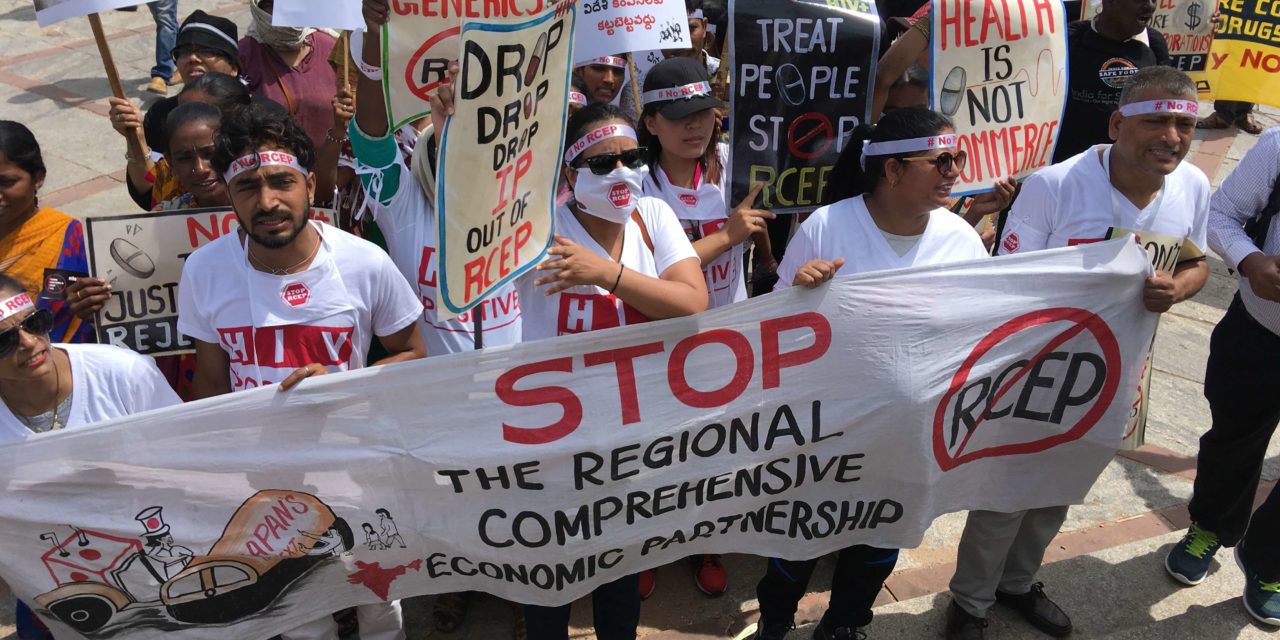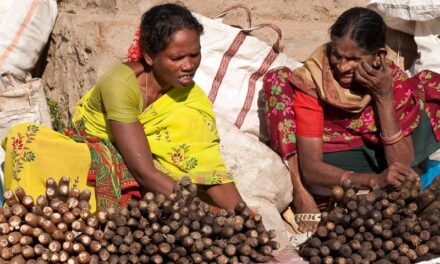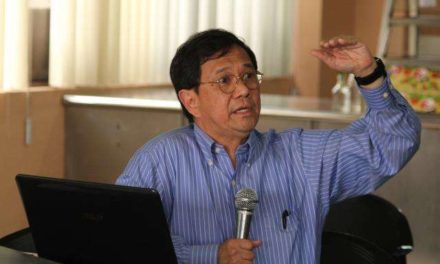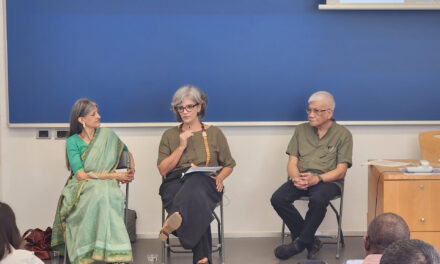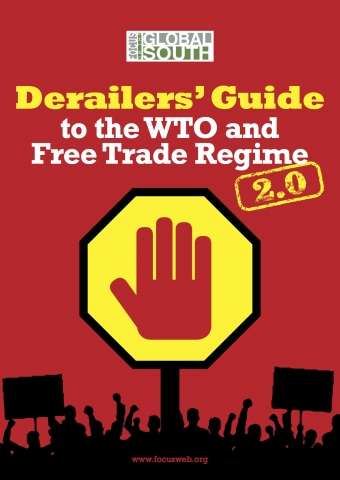Hyderabad, India — People’s groups from across the country converged in Hyderabad from July 22-26 to unanimously reject the RCEP (Regional Comprehensive Economic Partnership). The RCEP is a proposed mega regional FTA, which 16 countries including India are negotiating. The countries include ASEAN countries plus ASEAN’s six FTA partners India, China and Australia, Japan, South Korea and New Zealand.
In a People’s Convention under the banner ‘People’s Resistance Forum against FTAs and RCEP’ on July 23, hundreds of peasants, agricultural workers, animal rearers, women farmers, fishworkers, trade unions, women’s organisations, industrial and mining workers, hawkers and street vendors, sex workers, public services employees, students, engineers, teachers, lawyers, environmental activists, HIV-positive persons, Dalits and Adivasis voiced apprehensions about RCEP.
“RCEP is taking away seeds from farmers. There can be no food sovereignty without seed sovereignty. Women farmers should unite to reject FTAs that trade away farmers’ rights and land rights.” Burnad Fatima, Asia Pacific Forum on Women Law and Development (APWLD).
“The e-commerce chapter in RCEP will allow foreign technology corporations greater access to India data and threaten the protections to India’s digital industry.” Parminder Jeet Singh, IT for Change
“The stringent intellectual property proposals in RCEP will create monopolies, impact generic production and adversely affect access to affordable medicine.” Leena Menghaney, MSF
“Free trade agreements imply neither freedom nor are based on agreements. Disclosure, transparency and open discussions are required on RCEP whose texts are couched in complicated legalese.” Yogendra Yadav, Swaraj Abhiyan and All India Kisan Sangharsh Coordination Committee.
Speakers expressed concern that the agreement was being negotiated in complete secrecy at the Hyderabad International Convention Centre. The RCEP chapters have been negotiated behind closed doors. Few texts under negotiation have been ‘leaked’ online and analysed which are the only source of information. The analysis indicates that the RCEP as the world’s largest mega-FTA will impact nearly every sector of the economy and all aspects of society and is an onslaught on people’s lives, livelihoods and human rights.
At a time when farmers are agitating for better crop prices and committing suicide In India, RCEP would remove import tariffs, throwing the farmers further into crisis with cheaper imports of crops and milk products. Local manufacturing will take a hit, with workers losing their jobs and wages, getting pushed into unorganised sector. With stronger patent rights for big pharma companies, RCEP will increase the costs of medicines and damage India’s manufacture of generic drugs. Public services such as health and education will be even more privatised, making it prohibitive for the masses to access. Rules under RCEP will also facilitate free access to Indian data by global big business, giving them control over every sector.
The experiences of over the last two decades of corporate globalisation have shown that the already marginalised and most vulnerable sections such as Dalits, adivasis, small farmers, unorganised workers, denotified tribes, minorities and women stand to lose the most.
RCEP is only another face of corporate globalisation. It creates more rights for big corporations and grants investorsThe powerful tools like the investor-state dispute settlement (ISDS) mechanism, which obligates the government to protect the safety of investments of foreign companies at the cost of the rights and interests of its citizens. The agreements undermine the sovereignty of our governments to make its own laws and policies as per our needs.
It is shocking that such far-reaching agreements are being negotiated without discussion either with the public or in the Parliament, State legislatures and local self governments. In the above light, the following is demanded:
- We want democratic governments to retain the sovereignty to make laws and policies in the interests of the citizens, particularly the more vulnerable sections – whether on import tariffs, subsidies, minimum wages or protections for people and environment.
- India should immediately halt RCEP talks and negotiations on other FTAs.
- Indian government should place all details of the negotiations before the public and hold extensive and meaningful consultations on FTAs with people’s organisations including farmer unions and trade unions.
- The government should immediately debate RCEP and other FTAs in the Parliament, and hold consultations with state governments and local bodies.
- India should adopt a law that no international trade agreement should come into force without ratification by the Parliament of India.
- All state governments and political parties should make clear their position on RCEP and other FTAs.
A statement was issued from the July 23rd convention which expressed the sentiment that such a convergence of movements was the beginnings of a new coalition from the ground up. A rally was organised at People’s Plaza, Necklace Road on July 24th where over 700 people came out in large numbers against RCEP. A press conference was organized at Press Club, Somajiguda on July 24 where individuals like Prof. Biswajit Dhar- JNU, Burnad Fatima- Asia Pacific Forum on Women, Law and Development, Shoko Uchida – Pacific Asia Resource Centre (PARC) Japan, Niabdulghafar Tohming- FTA Watch Thailand, Kiran Vissa- People’s Resistance Forum Against FTAs and RCEP and Shalini Bhutani – legal researcher & policy analyst spoke to the press.
UPDATE: 22 people from the Delhi Network of Positive People (DNP+), Positive Women’s Network and others were detained at Narsingi Police Station for two hours, for peacefully protesting outside the Hyderabad International Convention Centre on July 24. The HICC is where the 19th round of RCEP negotiations are currently underway amidst high-level secrecy and away from public scrutiny.The ‘People’s Resistance Forum against FTAs and RCEP’ condemns the detention of patient groups and HIV+ people who were only trying to make the point that RCEP’s proposed intellectual property rules will make life saving drugs unaffordable. The people’s summit reiterates the responsibility of governments to protect people’s lives and livelihoods before negotiating any such trade deals.
The People’s Summit will continue at the Sundarayya Vignana Kendram in Hyderabad with workshops on e-commerce, the agrarian crises, labour issues and social security, public services, fisheries, etc. till July 26th.
For analyses on different aspects of RCEP, please contact
Leaked RCEP ‘leaked’ texts available on:
For further information, please contact:
People’s Resistance Forum:
Kiran Vissa [email protected]
Charles Meesa [email protected]
Forum Against FTAs:
Urvashi Sarkar [email protected]

